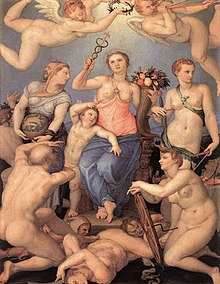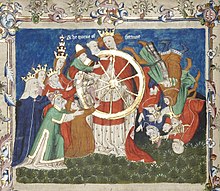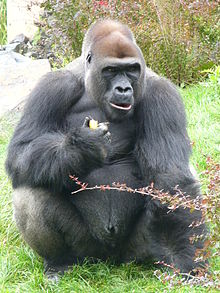Happiness
![]()
This article is about the phenomenon of happiness. For other meanings, see Happiness (disambiguation).
![]()
Glücksgefühl is a redirect to this article. For the TV crime thriller, see Tatort: Ein Glücksgefühl.
As a fulfilment of human desires and aspirations, happiness is a very complex concept that includes feelings ranging from momentary to lasting, from peaceful to ecstatic happiness, but which we can also encounter in relation to an external event, for example in the meaning of a happy coincidence or a turn of fate that favours happiness in life. In the former meanings the term happiness denotes an inwardly felt state, while in the latter it denotes an external favourable event.
The "pursuit of happiness" found its way into the Declaration of Independence of the United States, the founding document of the first modern democracy, as an original individual right of freedom. There it is referred to as the Pursuit of Happiness, after Thomas Jefferson. Today, the promotion of the individual human pursuit of happiness is the subject of specific research and counselling from neurobiological, medical, sociological, philosophical and psychotherapeutic points of view.

Allegory of Happiness (Agnolo Bronzino, 1546)

Since the Middle Ages, the ambivalence of luck has often been represented by the wheel of the goddess Fortuna.
Etymology and usage
The word "luck", from Middle High German glücke/gelücke (from the second half of the 12th century) or Middle Low German gelücke/lücke, originally probably meant "the way something ends/good turns out". Luck was therefore the favourable outcome of an event. To be distinguished from this is Glückseligkeit, which is usually explained and understood in connection with a state of (religious) salvation or a high degree of self-satisfaction.
In other languages, there is a clear distinction between the meanings of the words "to be lucky" and "to be happy". In English, for example, there are the expressions to be lucky ("to have luck"; derived from luck) and to be happy ("to be happy", from happiness). Already in Greek there is the distinction between eutychia and eudaimonia. The Latin also distinguished between fortuna and felicitas, and the French between la bonne chance and le bonheur. The opposite of luck (in the sense of "being lucky by chance") is unpredictable misfortune, disaster or bad luck.
Sanskrit has more than ten words to describe feelings of happiness, such as sukha for happiness that gives a pleasant sensation, krtarthata for satisfaction after a deed, ananda for joyful bliss, sampad for the pleasant bodily sensation after yoga exercises, or harsha for the feeling of happiness after the startling sight of a deity.
To be lucky in the chance sense means to be favored either by fate or by an unpredictable event. Examples include winning the lottery, roulette or any other game of chance; it also includes avoiding a disadvantage by chance. The prerequisite for this on the part of the "lucky person" is neither a certain talent nor even one's own contribution. On the other hand, the vernacular asserts an at least partial responsibility of the individual for the attainment of happiness in life in the saying: "Everyone is the architect of his own fortune". According to this, the ability to be happy in a given situation depends not only on external circumstances but also on one's own attitudes and efforts.
A lucky streak is called the stringing together of several positive experiences (see also hot-hand phenomenon). The lucky streak is, as the word origin "luck" suggests, attributed to (lucky) coincidence, even if in many cases it is the foreseeable result of hard work and only the temporal proximity is coincidence. In philosophy, the idea of a lucky streak goes back to Criton's eudaemonism.
Triggers of feelings of happiness
Biology
Physiological triggers
Research findings in the neurosciences have provided important insights into the biological basis of feelings of happiness. In the course of the ongoing intensive brain research, the level of knowledge in this regard is likely to be further expanded. Endorphins, oxytocin and the neurotransmitters dopamine and serotonin have been shown to have a significant influence on feelings of happiness. The brain releases these neurotransmitters during various activities, for example during food intake, sexual intercourse or sport, but also in a state of contented relaxation, in which serotonin and endorphins are involved.
The fact that chemical substances have a great effect on our emotional life, that they can change our state of mind in the short term and help determine our behaviour, partly calls into question the conventional view of human beings, says author Stefan Klein: "We see ourselves as spiritual beings, feel animated by hopes, thoughts, desires, not by chemistry. When we fall in love or look proudly at our children, can we really believe that this joy of existence is nothing more than the flow of some chemicals in our heads?" But the connections are not quite that simple, Klein emphasizes: "The formulas dopamine equals lust, oxytocin equals motherly love are only true to a very limited extent - if only because these neurotransmitters are not single culprits." Certain neurotransmitters play a major role in the human emotional balance, but only in a multifaceted structure of effects.
Produced by the pharmaceutical industry for medical purposes, such substances are used as medicines for depression, for example. Many drugs also cause the release of such substances in the brain in unnaturally high doses; due to consumption, there is a 'flooding' with these endogenous messenger substances during the period of action, which can cause an intense feeling of happiness in the user.
Evolutionary biology basics
From the point of view of evolutionary biology, there is no conscious pursuit of happiness in the behaviour of living beings. However, those animals and humans in particular have produced and continue to produce generations of offspring capable of survival for whom such behaviours were or are coupled with pleasant feelings that ensure their own survival, success within the social group and the safe rearing of a healthy offspring.
In humans, the feeling of happiness has become partially detached from the original reward function for behaviors that serve to produce offspring. Various techniques are now used to achieve feelings of happiness as an isolated goal. These include entertainment, status symbols, and drugs. Because of the human capacity for conscious experience, this change has far-reaching consequences. The incentive of a good mood as a reward for "something" can now be replaced by the fantasy of feeling happy for "nothing".
Psychology
Sources of Happiness
In a telephone survey of 1,000 respondents conducted by Time magazine in 2004, more than half of the respondents said that their children/grandchildren (35%) or family (17%) had brought them the greatest happiness in their lives, 11% said their religion, and 9% said their partner.
Moments of happiness in everyday life
In the same year, a team led by Daniel Kahneman in Texas used daily calendars and questionnaires to investigate among 900 women which of the activities on the previous day caused the participants which feelings. For self-assessment, seven-point scales were offered, including how happy one was during an activity and how much fun one experienced. The five most positive activities of the previous day turned out to be (in descending order): sex, socializing, relaxing, praying/meditating, and eating. A little behind were exercising and watching television. But only further down, after cooking, came "I take care of my children", which was only just ahead of housework.

Expression of happiness in the facial expressions of a sated infant?

Gorilla: Feelings of happiness triggered by the pleasant taste of the food promote the behaviour of food intake as an additional stimulus.
Questions and Answers
Q: What is happiness?
A: Happiness is a feeling of pleasure and positivity.
Q: How do people feel when they are happy?
A: When someone is happy, they feel good, proud, excited, relieved or satisfied.
Q: Can someone feel happiness and sadness at the same time?
A: Yes, it is very possible to feel both happiness and sadness at the same time, often about different things or sometimes even about the same thing.
Q: What can feeling happy help people to do?
A: Feeling happy may help people to relax and to smile.
Q: Is it possible for someone to constantly be happy or sad?
A: No, many philosophers have said that people in the world go back and forth between times of happiness and sadness, but there is nobody who is always happy or always sad.
Q: Why do some people cry when they are happy?
A: Happiness sometimes causes people to cry when they laugh because the emotion takes control of them.
Q: What did ancient civilizations such as the Incas and the Mayans think of happiness?
A: Happiness was thought of as the key to love in ancient civilizations such as the Incas and the Mayans.
Search within the encyclopedia